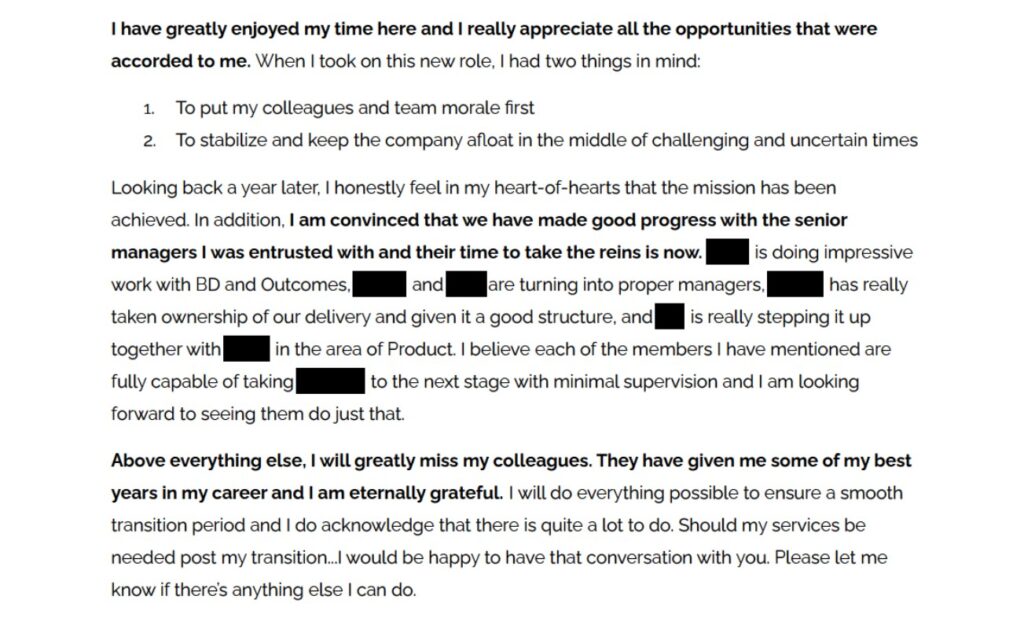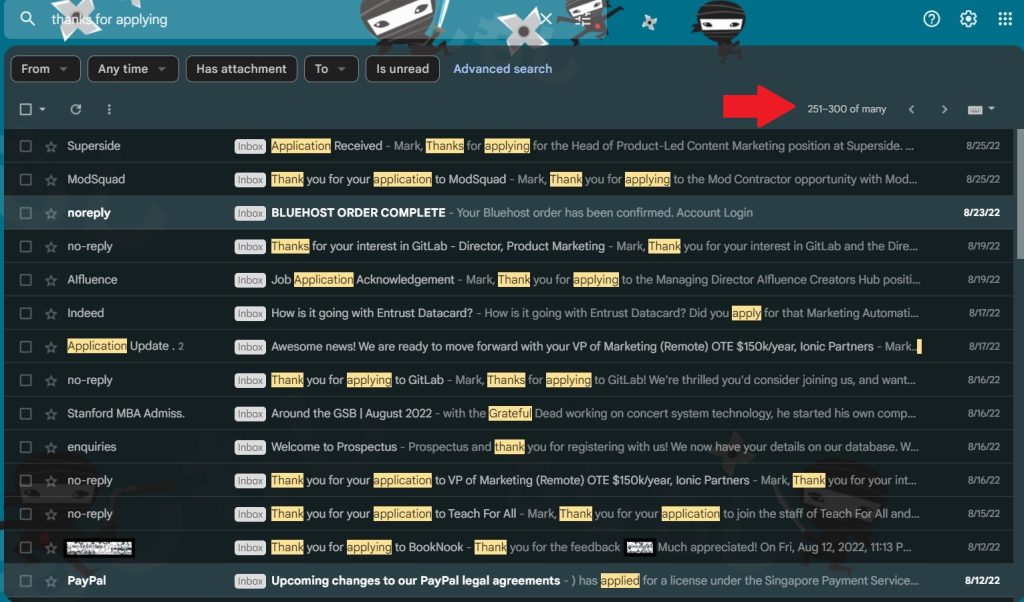
Career Typecasting: How it Affects You & Ways to Unshackle Yourself
My introduction with Career Typecasting
Before we dive into career typecasting…let me take you to October 13th 2021, the day I finally gathered enough stones to submit a resignation letter that had been sitting on my drafts for the last 6 months. I was going to be leaving behind a rising career, during a pandemic, and a company that had been good to me. The future was uncertain but I had a lot of conviction with my decision. I was going to face the world with the innocence of a child and the confidence of a fool. I felt I had served my time and I was ready for what life had next in store for me. Below is a short snippet of what my letter read:

Plans for my next professional moves
After the conclusion of my notice period, I wanted to bask in at least 3-6 months of sabbatical replenishment before getting back into the corporate scene. As we all know, failing to plan, is planning to fail, so I decided to keep all my options open and give myself a good buffer of opportunities by passively applying for roles I found interesting every now and then. Over 300 job applications sent and a little over one year later, I am back with lessons to share with you from my own experience!

Career Typecasting: What is it?
Career typecasting, also known as occupational stereotyping, is a common phenomenon in the employment industry where an individual is perceived and defined by a particular set of skills or roles that they have previously held. This situation often leads to limiting job opportunities which hinders career growth and impacts an individual’s overall professional development. In short…the employment industry will at some point probably punish you for your past successes by putting you in a box based on the skills and abilities you’ve exhibited in previous roles.
How does career typecasting show up or look like?
If you have ever applied for employment at any point in your life, you will have encountered career typecasting in its different forms which we can break down as follows:
- Stereotypical Typecasting: Stereotypical typecasting occurs when an individual is perceived based on generalizations and assumptions made about their gender, race, ethnicity, or other demographic characteristics. This form of typecasting can limit an individual’s opportunities for career advancement, regardless of their qualifications or experience e.g.
- Assumptions that females are not suitable for certain roles or industries like construction
- Your age being used as a determinant of how much salary you should command
- Local companies preferring to get freelancers from India rather than finding local talent
- Functional Typecasting: Functional typecasting occurs when an individual is viewed as being suitable for a specific type of job, based on their previous experiences and skills. This form of typecasting can limit an individual’s job opportunities, as employers may be less likely to consider them for positions outside their area of expertise e.g.
- NGOs only shortlisting from candidates with NGO experience
- FMCGs only shortlisting from candidates with FMCG experience
- Startups only shortlisting from candidates with startup experience
- Corporates only shortlisting from candidates with corporate experience
- Professional Typecasting: Professional typecasting is a result of individuals being categorized based on their job title, work experience, and professional reputation. This form of typecasting can limit an individual’s opportunities for career growth and professional development, as they may be perceived as being suitable only for a specific type of work e.g.
- Your manager not giving you responsibilities outside your scope of work
- You don’t get shortlisted for roles that don’t appear as titles on your resume
- You only get shortlisted for roles that are similar to previous titles you’ve held.
Impact of career typecasting on professional development
When individuals are typecast, they may be overlooked for job opportunities and promotions, leading to a lack of career growth. Typecasting can limit an individual’s ability to expand their skill set and experience, leading to a lack of professional development.
According to a study by the Harvard Business Review, 72% of professionals feel that they have been typecast in their careers. This can have a significant impact on an individual’s career progression, with a separate study by the Center for Talent Innovation finding that 64% of professionals who feel typecast are less likely to be promoted.
Harvard Business Review & Center for Talent Innovation
Reasons for career typecasting
Employer Tendency: One of the main reasons for career typecasting is the tendency for employers to hire individuals who have a proven track record in a specific field or industry. This approach is often viewed as a way to reduce risk and increase the likelihood of success. However, it can also lead to a lack of diversity in the workforce, with a study by McKinsey & Company finding that companies in the top quartile for ethnic and racial diversity are 35% more likely to have financial returns above their industry median.
Job Seeker Presentation: Another reason for career typecasting is the way in which an individual presents themselves during the job search process. Job seekers who focus on a specific set of skills or experiences may be perceived as only being suitable for certain types of roles. This can limit the types of job opportunities that are presented to them and can make it more difficult for them to break out of a particular job type. This is the top reason why career coaches will advise you to customize your resume to fit the job you’re applying to – this can be as simple as using terminologies specific to the industry you’re applying to.
Breaking free from career typecasting
Proactive Career Development: With each job listing requiring a minimum of not less than 2-3 years of professional experience, it shows that companies are less willing to invest in formal training – a trend that has been declining since the early 2000s (journal here). We are officially in the era of do-it-yourself career development where it is important for individuals to take a proactive approach rather than relying on their managers and companies to provide a learning and development budget.
This includes being open to new opportunities and exploring different industries or roles that align with your skills and interests. It also includes developing a diverse set of skills and experiences that can be transferred to different types of roles. Some tips you can use to take charge of your career development can be:
- Have a clear job description and understand what you’re evaluated on: A clear job description will tell you what is in your scope of work vs what is needed for the next step-up in responsibilities. It helps you understand what success looks like in your position by clearly stating what your job goals and success metrics are. If you don’t have a clear JD…it’s best to approach your manager today and request so that you can have a clear direction. As you continue to hit your targets, you can request for their feedback on how to stretch yourself in order to hit your ambitions.
- Solve for your own blind spots: Top performers are always learning and adjusting, and routinely seek feedback from their boss, peers, and subordinates. If your boss doesn’t proactively give you feedback, start the conversation yourself. After completion of an impactful assignment always seek to get feedback on one thing that went well, and then ask for advice on one thing you could improve on. Simplicity wins because most people can only absorb one area to improve at a time. Remember to thank those who are gracious enough to give you constructive and actionable feedback
- Document your learnings: When you do a skills or competency assessment, you will probably have some areas of strength and some areas for growth. Prioritize putting more effort in the growth areas and record the initiatives you are taking to improve on them. Seeking feedback from someone who previously held your job can speed up your learning.
- Increase your visibility with the C-suite: Depending on your position in the food chain, it’s not always possible to get noticed by senior leaders through your direct work. To get recognition, you can experiment with volunteering to take the lead on initiatives that involve the entire company such as making presentations at all-hands meetings, raising your hand and asking thought proving questions after they make a presentation. This is an easy but often overlooked way to rub elbows with senior people who will see you in action and ideally take notice of your contributions.
- Become an expert or thought-leader in an area of increasing importance to your company or industry: Your company may be grappling with a disruption from a new technology such as the internet of things, artificial intelligence, or cloud-based computing. Become the expert person in your department on an emerging issue. Conduct research and literature reviews, attend conferences, or write on the topic. Developing expertise in a nascent area of growing importance can lead to promotions and other career opportunities.
- Seek good counsel and mentoring: In a previous article, we talked about the importance of getting a career coach. The perspective of a senior person who can help you navigate your career is an invaluable asset to have in your corner.
- Network and build relationships: Networking and building relationships with professionals in different industries can also help you learn about different job opportunities and to gain insights into the skills and experiences that are valued in different fields. In networking events and conversations it will be important that you are able to articulate the transferable skills and experiences that you have in order to help potential employers to see the value that you can bring to their organization.
- Have a strategic approach to your job searches: Another way to overcome career typecasting is to be more strategic in the job search process. This includes tailoring resumes and cover letters to the specific job or industry being applied to. It also includes highlighting skills and experiences that are relevant to the job and showing how they can be applied to the role.
What next?
For hiring managers and HR Professions: It is important to challenge the perceptions that put people in boxes whether by our own biases (unconscious or conscious) that leads to less diversity in the workplace when we constantly hire the same profile for specific roles. For every potential game-changing recruit that you’re turning away because of your hiring frameworks, your competitors might be building the arsenal that will blow you out of the water in the near future.
This requires for anybody with hiring responsibility to have open conversations on this topic and I am happy to engage on the same.
For my own personal growth: I will continue to use my own advice on career growth. Rather than fold my hands and wait for opportunities to come my way, I am in the process of developing myself to make my own way. Stay tuned for my next post on “Becoming A High Agency Individual” that touches this topic a little. In the meantime, feel free to register or share my upcoming business masterclass that covers all the basics you need to know on Running Successful Product, Marketing, and Business Strategies.
